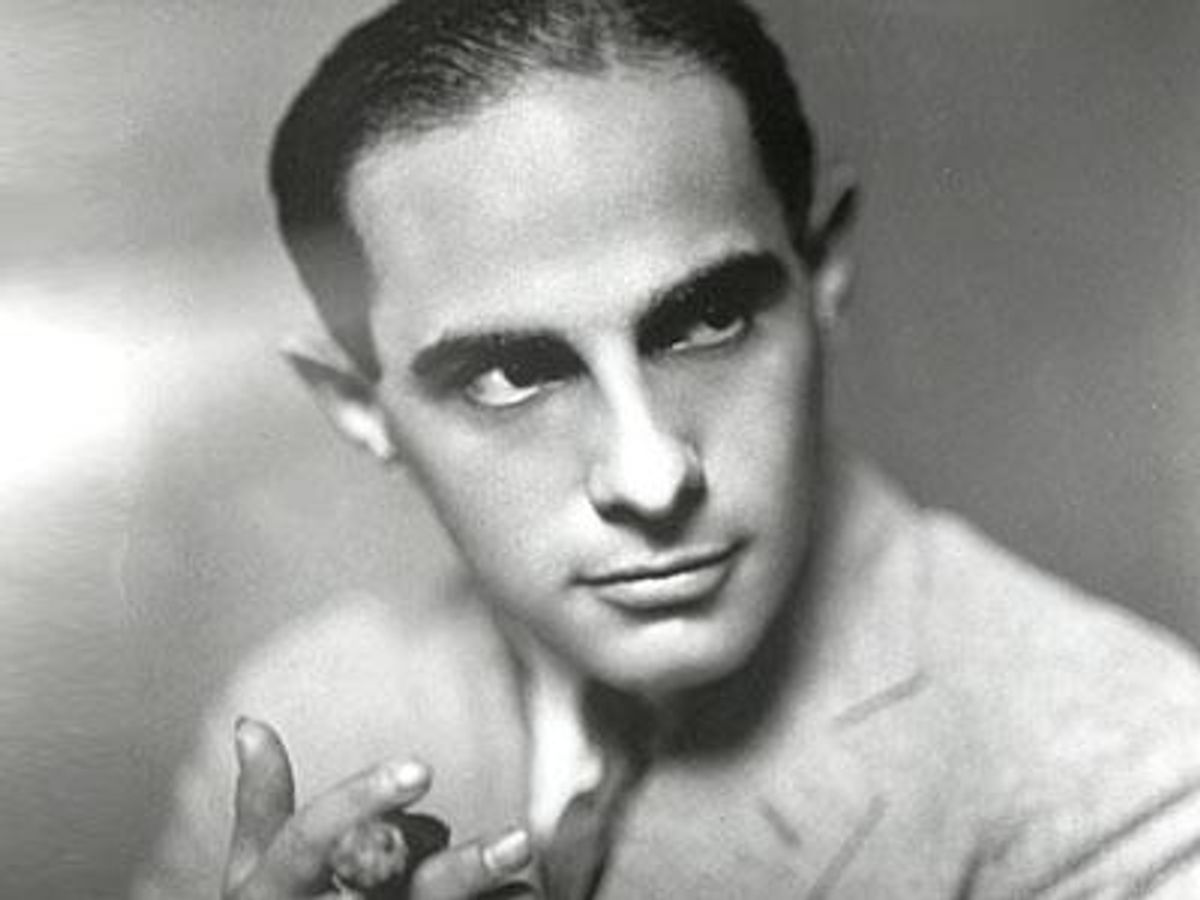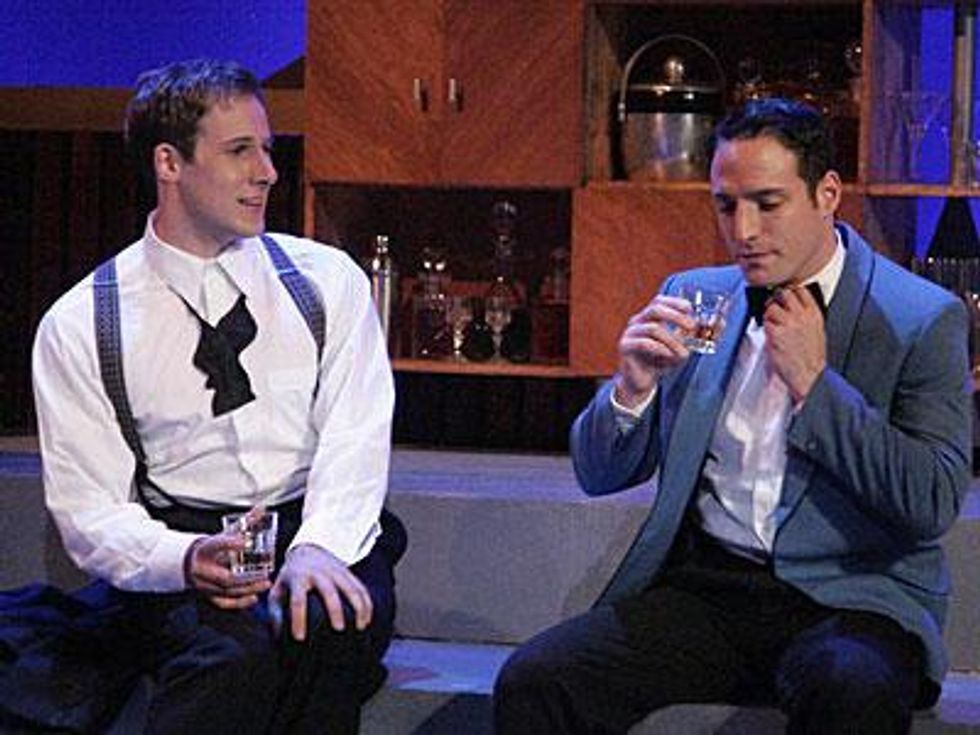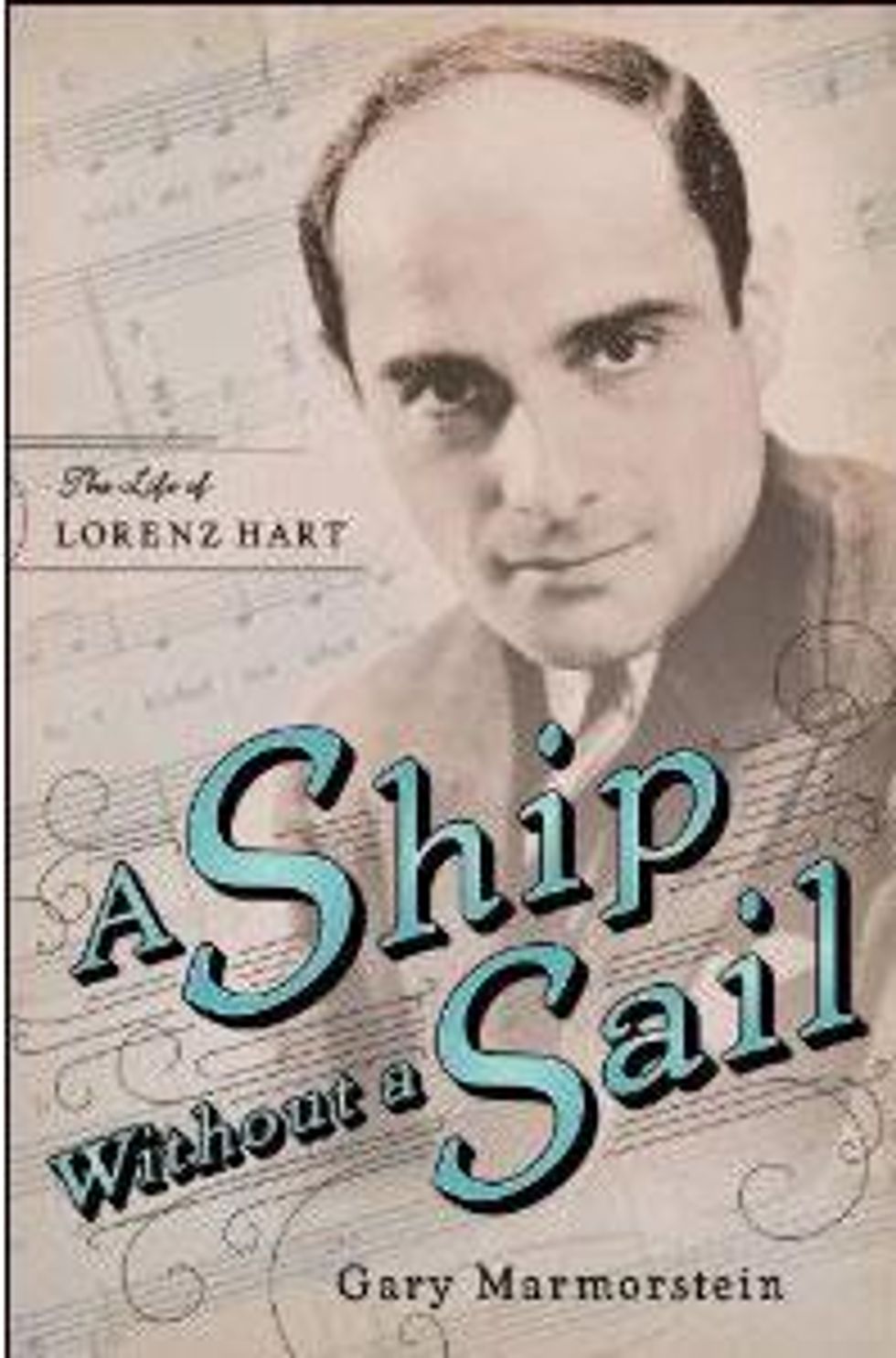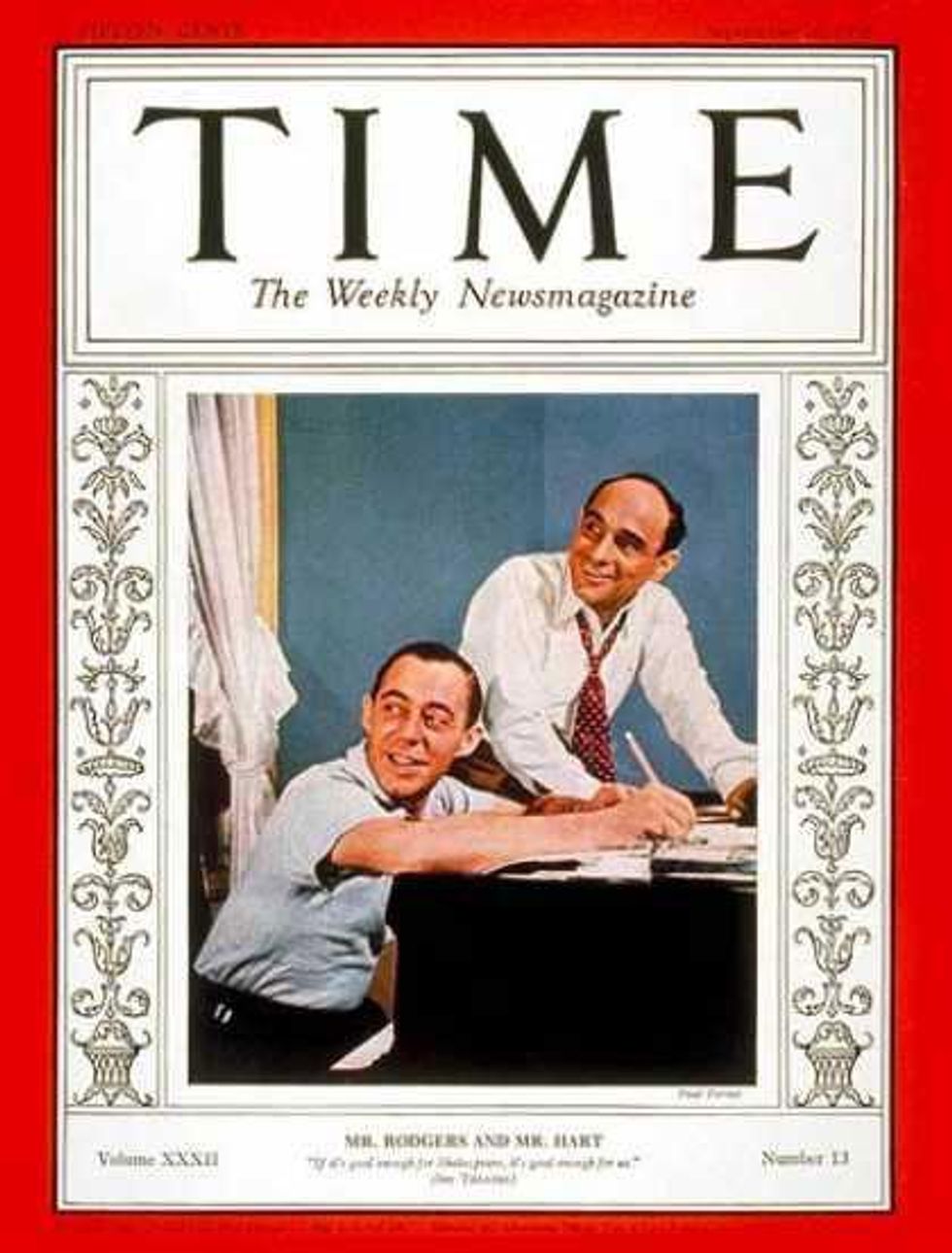
He wrote some of the greatest love songs ever, but Lorenz Hart's own story was largely kept a secret.
June 11 2013 6:00 AM EST
November 17 2015 5:28 AM EST
trudestress
By continuing to use our site, you agree to our Private Policy and Terms of Use.

F. Scott Fitzgerald called him America's poet laureate. Stephen Sondheim said he "freed American lyrics from the stilted middle-European operetta technique." Fred Ebb said he "made all lyricists a little braver." And he wrote some of the greatest love songs ever, but his own love life took place largely in secret.
The subject of all those statements is Lorenz "Larry" Hart, the gay man who was the primary writing partner to composer Richard Rodgers in the 1920s and '30s, preceding Rodgers's other celebrated collaboration, with Oscar Hammerstein II.
Hart has long held a place in the pantheon of great American lyricists, with songs that display a wit and creativity perhaps equaled only by Cole Porter's work. The many classic tunes he wrote with Rodgers -- "My Funny Valentine," "The Lady Is a Tramp," "Bewitched," scores of others -- are staples of jazz vocalists, piano bar performers, and any aging rocker who records an album of standards.
But less is known about Hart the man. The basic outline is that he was a short, hard-drinking, irresponsible charmer who died young, at age 48, in 1943. No one disputes that he was gay, but details about this aspect of his life are scarce.
Now a new play, having its world premiere in the Los Angeles area, aims to enlighten audiences about Hart's gay life in a closeted era. Falling in Love With Make Believe, written by Mark Saltzman, directed by Jim Fall, and featuring 21 Rodgers and Hart songs, opened in April at the Colony Theatre in Burbank and began an encore run there this month due to popular demand.
"The particulars of most love affairs of gay celebrities in the pre-Stonewall era were scrupulously eradicated from the record, often by families who literally burned love letters and journals," Saltzman says in an interview published in the program. "So it's very hard to find evidence of these past romances. ... The details of the Rodgers and Hart professional life are readily available with some Googling. But what's missing, what's been eradicated and will never be uncovered by historians, that's for the dramatists to fill in."
Many such trysts, according to both Marmorstein and the play, were set up by Milton "Doc" Bender, a dentist turned talent agent and a longtime friend of Hart's. He's portrayed in the play by Jeffrey Landman, who conveys cynicism beautifully when performing "Falling in Love With Love," which provides the show with its title via the lyric "Falling in love with love is falling for make-believe."
If love seemed like make-believe to Hart, it's not only because of the difficulties involved in living an openly gay life in the era, it's also because he was extremely short -- not even five feet tall -- and not conventionally attractive. He was, however, witty, intelligent, charming, and generous, a desirable partner in many ways. But he was also an alcoholic, and he became increasingly undependable, trying the patience of the businesslike Rodgers.
Ben D. Goldberg (who is attractive, by the way) plays Hart in Falling for Make Believe, and he does an excellent job, as do the remaining cast members portraying real-life personages: Brett Ryback as Rodgers; Jordan Kai Burnett as Rodgers's wife, Dorothy; and scene-stealer Rebecca Ann Johnson as Vivian Ross, a character based on Broadway star Vivienne Segal. Segal appeared in several Rodgers and Hart musicals, including A Connecticut Yankee in King Arthur's Court, and was a close friend of both men. According to both the play and Marmorstein's book, Hart even proposed marriage to her, apparently thinking they could be a platonic couple like the gay Cole Porter and his socialite wife, Linda. Viv, by all accounts, did not take him seriously.
The conventional wisdom is that Rodgers's teaming with the witty, sophisticated Hart produced better songs, while his partnership with the earnest, sentimental Hammerstein resulted in better shows. In Rodgers and Hart's heyday, musical plots were even thinner than they are now, and songs sometimes did not bear any great relation to the story. 1943's Oklahoma!, Rodgers's first collaboration with lyric- and book-writer Hammerstein (after Hart turned down the project), is considered a milestone in the integration of story and song, building on what Hammerstein and composer Jerome Kern accomplished in 1927's Show Boat. Rodgers and Hammerstein became the kings of Broadway in the 1940s and '50s, bringing serious themes to musical theater, and their greatest hits -- Oklahoma!, Carousel, South Pacific, The King and I, The Sound of Music -- are still frequently performed and have been immortalized on film.
Rodgers and Hart's shows are less often revived, and the few film versions -- Babes in Arms, I Married an Angel, Pal Joey -- are not particularly faithful to the originals and scrap or swap out many of the songs. But the team did advance the Broadway musical, and not just through their tunes. They were not often credited with work on the book, or script, for their musicals, On Your Toes and Babes in Arms being notable exceptions. Still, they frequently had a good deal of input, and their choice of subject matter is often notable. They had a groundbreaking antihero in Pal Joey's title character, an unscrupulous nightclub performer, drawn from stories by John O'Hara. They successfully musicalized Shakespeare in The Boys From Syracuse, based on The Comedy of Errors. On Your Toes pioneered the use of ballet sequences on Broadway with "Slaughter on Tenth Avenue," and Hart pushed for its inclusion. A 1998 regional revival of Babes in Arms showed the quintessential kids-putting-on-a-show musical to be "wildly satirical, surprisingly topical and a bit peculiar," according to theater historian Tom Briggs, who said it "still works like gangbusters."
(RELATED: Hear the Music of Rodgers and Hart)
If you can't catch one of the infrequent revivals of their shows, films do provide a good opportunity to hear Rodgers and Hart songs. In movies they're probably best represented by Pal Joey; the so-so screenplay reworks the original to fit Frank Sinatra, but he does a great job of singing many Rodgers and Hart classics, including some from other shows. The corny, wildly inaccurate 1948 biopic Words and Music, with Mickey Rooney as a heterosexual Hart, is made palatable by a feast of songs performed by Rooney, Lena Horne, Mel Torme, Perry Como, and especially Judy Garland. The team also wrote directly for the screen, most notably for the sophisticated 1932 comedy Love Me Tonight, in which Maurice Chevalier introduced "Isn't it Romantic?" And their songs make for memorable moments in many other movies, such as Michelle Pfeiffer's breathy rendering of "My Funny Valentine" over the end credits of The Fabulous Baker Boys. On recordings, singers who have mined the Rodgers and Hart songbook range from Ella Fitzgerald, Barbra Streisand, and Tony Bennett to Rod Stewart and Lady Gaga.
And if you're anywhere near Southern California, by all means go see Falling for Make Believe; here's hoping it will be performed elsewhere soon as well. If you're not familiar with Rodgers and Hart, it's a great introduction; if you are, you'll be, well, beguiled again.
Falling for Make Believe is scheduled to run through June 30 at the Colony Theatre. And you can learn more about Hart at LorenzHart.org.
Viral post saying Republicans 'have two daddies now' has MAGA hot and bothered